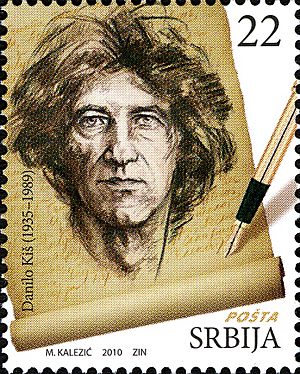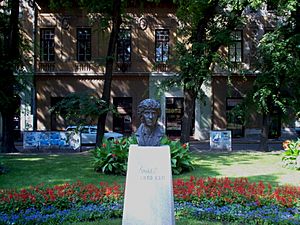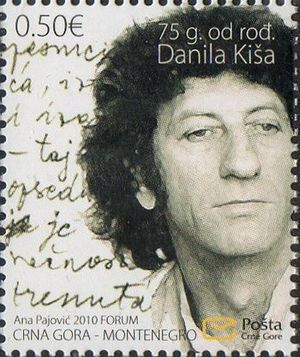Danilo Kiš facts for kids
Quick facts for kids
Danilo Kiš
|
|
|---|---|

Danilo Kiš on a 2010 Serbia stamp
|
|
| Native name |
Данило Киш
|
| Born | Dániel Kiss 22 February 1935 Subotica, Kingdom of Yugoslavia |
| Died | 15 October 1989 (aged 54) Paris, France |
| Resting place | Belgrade's New Cemetery |
| Occupation | |
| Language | Serbian, Serbo-Croatian, Hungarian |
| Alma mater | University of Belgrade |
| Spouse |
Mirjana Miočinović
(m. 1962–1981) |
| Parents | Ede Kiss Milica Dragićević |
Danilo Kiš (Serbian Cyrillic: Данило Киш; born Dániel Kiss; 22 February 1935 – 15 October 1989) was a famous writer from Yugoslavia. He wrote novels, short stories, and essays. He also translated books from other languages. Some of his most well-known books are Hourglass, A Tomb for Boris Davidovich, and The Encyclopedia of the Dead.
Contents
Life and Work
Growing Up
Danilo Kiš was born in Subotica, which was part of the Kingdom of Yugoslavia (now Serbia). His father, Eduard Kiš, was a railway inspector who spoke Hungarian and was Jewish. His mother, Milica, was a Serbian Orthodox Christian.
His father's original last name was Kohn, but he changed it to Kis. This was part of a common practice at the time called Magyarization, where people changed their names to sound more Hungarian.
Danilo's father faced health challenges and was sometimes away from home. Young Danilo saw his father as an adventurous traveler and a writer. Later, Danilo based a character in his books, Eduard Scham, on his own father.
World War II and Its Impact
As World War II began, Danilo's parents worried about the growing hatred towards Jewish people in Europe. In 1939, when Danilo was three, they had him baptized into the Eastern Orthodox Church. Kiš later believed this act likely saved his life during the war.
In April 1941, Hungarian troops, who were allies with Nazi Germany, took over the northern part of Yugoslavia. Officials began to treat Jewish people badly. In January 1942, a terrible event happened in Novi Sad, where the Kiš family lived. Many Serbs and Jews were harmed or killed. Danilo's father, Eduard, was among those taken to the frozen Danube River to be shot, but he managed to survive. Kiš later said this event marked the start of his "conscious life."
After this, Eduard moved his family to a town in Hungary called Kerkabarabás. Danilo went to primary school there. For a while, Jewish people in Hungary were safer than in other countries. However, in mid-1944, authorities began sending Jewish people to concentration camps. Eduard Kiš was sent to Auschwitz and was killed there. Danilo, his sister Danica, and his mother Milica were saved, possibly because of Danilo and Danica's baptism certificates.
His father's death deeply affected Danilo's writing. He often wrote about his father as a "mythical figure" in his books. He would even say his father had "disappeared" rather than been murdered.
After the War
After the war ended, Danilo's family moved to Cetinje, in Yugoslavia. He finished high school there in 1954. Then, he went to the University of Belgrade to study literature. He was a very good student and was the first to earn a degree in comparative literature in 1958. He continued his studies for two more years.
Writing Career
While studying, Kiš wrote for Vidici magazine until 1960. In 1962, he published his first two novels, Mansarda (which means The Garret) and Psalm 44.
He then worked as a teacher at the University of Strasbourg until 1973. During this time, he translated many French books into Serbo-Croatian. He also wrote and published more of his own books, including Garden, Ashes (1965), Early Sorrows (1969), and Hourglass (1972). He won a major award, the NIN Award, for Hourglass, but he later returned it because of a disagreement.
Danilo Kiš was inspired by many other famous writers, such as James Joyce, Marcel Proust, Vladimir Nabokov, and Jorge Luis Borges.
Moving to Paris
After a disagreement about his writing, Kiš moved from Belgrade to Paris in 1979. In 1983, he published The Encyclopedia of the Dead. During this time, his books became known around the world and were translated into many languages.
Later Life and Death
In September 1989, Danilo Kiš was diagnosed with lung cancer. He died a month later, on October 15, 1989, at the age of 54. This was the same age his father had been when he was sent to Auschwitz. As he wished, he was buried in Belgrade following the Serbian Orthodox Church traditions.
Family and Friends
Danilo Kiš was married to Mirjana Miočinović from 1962 to 1981. At the time of his death, he was living with Pascale Delpech.
He was also a close friend of the writer Susan Sontag. After his death, Susan Sontag helped publish a collection of his essays and interviews called Homo Poeticus.
Writing Style and Themes

Danilo Kiš's writing was greatly influenced by authors like Jorge Luis Borges and Bruno Schulz. He learned to use "mythic elements" in his stories from Schulz.
His writing style changed over time. In his early books, like Psalm 44, Garden, Ashes, and Early Sorrows, he used a realistic style. He created characters whose thoughts and feelings showed the world he remembered, dreamed about, or experienced. He wanted readers to believe in the world he created, even if it was a bit like a "deception" through language. He aimed to make readers feel a sense of "recognition" with the stories.
In these early novels, he used traditional storytellers and told stories in order. But in his later novels, starting with Hourglass, his writing techniques changed a lot. He used fewer traditional storytellers, and his stories became more fragmented. For example, in Hourglass, he showed his father figure, Eduard Scham, in several different ways, using information that seemed like real documents.
This focus on using and changing "documentary evidence" became a key part of Kiš's later work. In A Tomb for Boris Davidovich, he used information from historical and political sources to speak out against Stalinism. Unlike some other writers, Kiš was interested in everyday life and ordinary people. In his story The Encyclopedia of the Dead, he imagined an encyclopedia that would have the life story of every ordinary person who had lived since 1789.
Books and Films
A film based on his novel Peščanik (Hourglass) was made in 2008 by Hungarian director Szabolcs Tolnai.
In May 1989, Danilo Kiš worked with director Aleksandar Mandić on a four-episode TV series called Goli Život. It was about the lives of two Jewish women and was filmed in Israel. This show was broadcast after his death in 1990 and was his last project.
Many of Kiš's important books were not available in English until the 2010s. Then, Dalkey Archive started publishing his works, including A Tomb for Boris Davidovich and Garden, Ashes. In 2012, they also released The Attic, Psalm 44, and a collection of stories called The Lute and the Scars. These translations helped more people in English-speaking countries discover his amazing stories.
See also
 In Spanish: Danilo Kiš para niños
In Spanish: Danilo Kiš para niños


